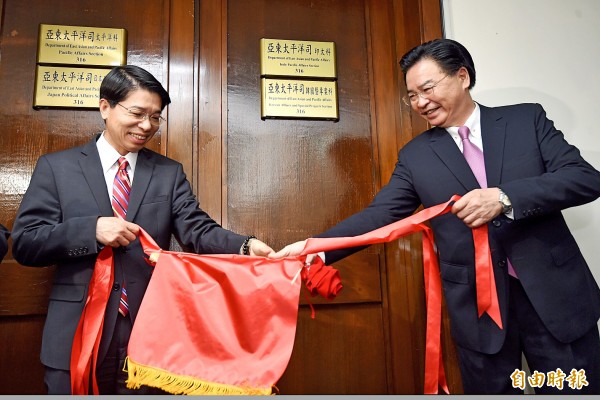《TAIPEI TIMES》 Minister thanks US Congress for NDAA

Minister of Foreign Affairs Joseph Wu, right, and Department of East Asian and Pacific Affairs Director-General Winston Chen unveil the plaque of the new Indo-Pacific Affairs Section in Taipei yesterday. Photo: Chien Jung-fong, Taipei Times
FRIENDLY ELEMENTS: The bill requires the US secretary of defense to conduct a comprehensive assessment on ways to enhance and reform Taiwan’s military forces
By Stacy Hsu / Staff reporter
Minister of Foreign Affairs Joseph Wu (吳釗燮) yesterday expressed gratitude to the US Congress for its support after the US House Armed Services Committee passed a National Defense Authorization Act (NDAA).
“[We] have noted the bill that is being deliberated in the US Congress, which includes many elements friendly toward Taiwan,” Wu said.
Wu said he is extremely grateful for the US Congress’ support for Taiwan, especially in the areas of national security and defense cooperation.
The US House Armed Services Committee on Thursday passed the latest version of the annual NDAA with a bipartisan vote of 60 to 1.
The bill still requires the approval of the US House of Representatives and the US Senate before it can be signed into law.
Under Section 1243 of the draft, the US secretary of defense is required to consult with Taiwanese officials to conduct a comprehensive assessment on ways to enhance and reform Taiwan’s military forces.
The section requests that the US secretary of defense, after consulting with the US secretary of state, submit a report to the appropriate US congressional committees within a year of the NDAA’s enactment, detailing a summary of the assessment and a list of recommendations and planned actions.
The report should also include a plan for the US to “expand senior military-to-military engagement and joint training by US Armed Forces with the military of Taiwan” and “support US foreign military sales and other equipment transfers to Taiwan, particularly for developing asymmetric warfare capabilities,” it says.
Ministry spokesman Andrew Lee (李憲章) said in a statement that the wording of the bill serves as the latest example of the US’ bipartisan emphasis on and support for the Taiwan-US security partnership.
The ministry would closely watch deliberations on the bill, Lee said.
The Ministry of National Defense yesterday said the bill would serve to stabilize regional security by expanding military exchanges between the US and Taiwan.
Ministry of National Defense spokesman Major General Chen Chung-chi (陳中吉) said the ministry is delighted to see measures that would boost the nation’s self-defense capabilities.
He also expressed gratitude to US representatives who are seeking to maintain stable bilateral ties based on the Taiwan Relation Act and the six assurances, which are the cornerstones of US-Taiwan relations in the absence of formal diplomatic relations.
Meanwhile, Wu, on the sidelines of a ceremony to open the foreign ministry’s new Indo-Pacific Affairs Section in Taipei yesterday, said Taiwan would endeavor to improve its defensive capabilities, adding that efforts would also be made to further Taiwan-US cooperation on security to maintain peace and stability in the Asia-Pacific region.
The new Indo-Pacific Affairs Section is part of the foreign ministry’s Department of East Asian and Pacific Affairs.
Wu said some like-minded nations, such as the US, Australia and Japan, have proposed the idea of a “free and open Indo-Pacific” region.
“They are all exploring ways to facilitate cooperation on trade and the value of freedom in the Indo-Pacific region. Taiwan must head in the same direction, which will be the focus of the new section,” Wu said.
Wu said the new section would guide the government’s New Southbound Policy and the Indo-Pacific global strategy, handling affairs concerning major actors in the region, including India, Australia and New Zealand.
Additional reporting by CNA
新聞來源:TAIPEI TIMES














